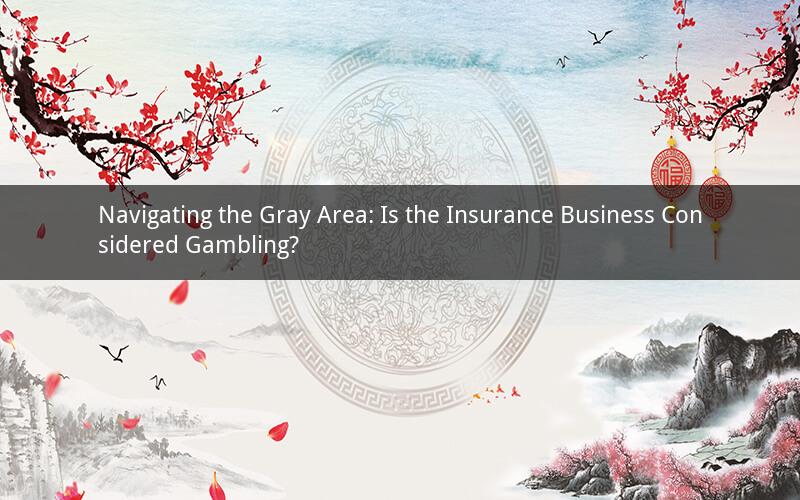
The insurance business, a cornerstone of financial security for millions, often finds itself at the crossroads of risk management and chance. As a sector that relies on predicting and mitigating uncertainties, it has long been debated whether insurance can be equated with gambling. This article delves into the nuances of this comparison, exploring the factors that differentiate the two and the ethical considerations involved.
1. What is Insurance?
Insurance is a contract between an individual or entity (the insured) and an insurance company (the insurer). The insured pays a premium in exchange for the insurer's promise to provide financial compensation in the event of a specified loss. This loss could be due to an accident, illness, natural disaster, or other unforeseen events.
2. The Nature of Risk in Insurance
Insurance operates on the principle of risk pooling. By pooling the premiums from many individuals, insurance companies can afford to pay out claims when needed. The risk is spread out, making it more manageable for the insurer to cover the costs of claims.
3. The Role of Prediction in Insurance
Insurance companies rely heavily on statistical data and actuarial science to predict the likelihood of certain events occurring. Actuaries analyze historical data to estimate the probability of loss and calculate the premiums accordingly. This process involves a degree of uncertainty, as no one can predict the future with absolute certainty.
4. The Gambling Element in Insurance
Some argue that insurance is akin to gambling because it involves paying for a potential future loss. However, this comparison fails to take into account the fundamental difference between the two. Gambling involves betting on uncertain outcomes with the intent of winning money, while insurance is a risk-sharing arrangement aimed at providing financial protection against unforeseen events.
5. Ethical Considerations in Insurance
The insurance business must navigate a fine line between profit and ethical considerations. Insurance companies must ensure that their policies are fair and transparent, and that they do not take advantage of their customers. This includes providing accurate information about coverage, premiums, and exclusions.
6. The Importance of Diversification in Insurance
Diversification is a key component of the insurance business. By offering a wide range of policies and covering various risks, insurance companies can attract a broader customer base and reduce their exposure to any single risk. This diversification also helps to mitigate the impact of unexpected events on the insurance industry as a whole.
7. The Role of Government Regulations
Government regulations play a crucial role in ensuring that the insurance industry operates fairly and responsibly. These regulations help to protect consumers from fraudulent practices, ensure that insurance companies maintain adequate reserves, and promote competition in the market.
8. The Insurance Industry's Response to Climate Change
As the frequency and severity of natural disasters increase due to climate change, the insurance industry faces new challenges. Insurers must adapt their risk assessment models and develop innovative solutions to address the growing risks associated with climate change.
9. The Future of Insurance
The insurance industry is undergoing a digital transformation, with advancements in technology and data analytics playing a significant role. Insurers are leveraging big data, artificial intelligence, and machine learning to improve their risk assessment models, personalize policies, and offer more efficient customer service.
10. Conclusion
While the insurance business may share some similarities with gambling, it is fundamentally different in its purpose and structure. Insurance is a risk-sharing arrangement aimed at providing financial protection against unforeseen events, while gambling involves betting on uncertain outcomes for the purpose of winning money. As the insurance industry continues to evolve, it must remain committed to ethical practices and customer protection.
Questions and Answers:
1. Q: How does the insurance business differ from gambling?
A: Insurance is a risk-sharing arrangement aimed at providing financial protection against unforeseen events, while gambling involves betting on uncertain outcomes for the purpose of winning money.
2. Q: What role does actuarial science play in the insurance business?
A: Actuarial science is used to analyze historical data and predict the likelihood of certain events occurring, which helps insurance companies calculate premiums and manage risk.
3. Q: How do government regulations impact the insurance industry?
A: Government regulations ensure that the insurance industry operates fairly and responsibly, protecting consumers from fraudulent practices and promoting competition.
4. Q: What is the importance of diversification in the insurance business?
A: Diversification helps insurance companies spread out risk and attract a broader customer base, making it more manageable to cover the costs of claims.
5. Q: How is the insurance industry adapting to the challenges posed by climate change?
A: The insurance industry is leveraging technology and data analytics to improve risk assessment models and develop innovative solutions to address the growing risks associated with climate change.